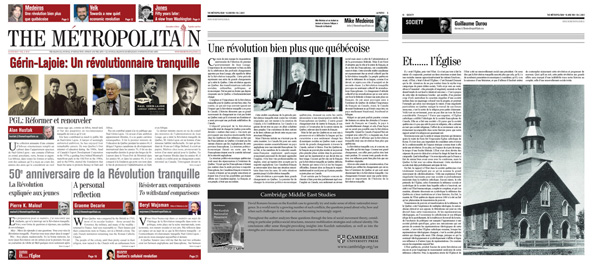The dissolution of Mont-Royal riding must not be allowed to stand. We must respond to the "fierce urgency of now!"
By Beryl Wajsman on March 22, 2017
 The decision of the Director-General of Elections to eliminate Mont-Royal riding cannot be allowed to stand. It is about the compromise of our most basic rights as citizens. It is about the disenfranchisement of our suffrage. It is about the second largest population of the economically vulnerable on the island not having a place to turn to. It is about anglophones and allophones losing a voice in our Assembly of law and legislation. It is about natural communities torn asunder with some moved into ridings represented by elected officials with neither the time nor understanding of their particular needs. It is a decision of egregious hypocrisy.
The decision of the Director-General of Elections to eliminate Mont-Royal riding cannot be allowed to stand. It is about the compromise of our most basic rights as citizens. It is about the disenfranchisement of our suffrage. It is about the second largest population of the economically vulnerable on the island not having a place to turn to. It is about anglophones and allophones losing a voice in our Assembly of law and legislation. It is about natural communities torn asunder with some moved into ridings represented by elected officials with neither the time nor understanding of their particular needs. It is a decision of egregious hypocrisy.
A SHOUT OUT TO YOUTH
By Father John Walsh on July 6, 2013
 It is time to take off the gloves.
It is time to take off the gloves.
I find you are amazing the world with your innovations, making incredible strides in so many fields of endeavour, and you are greatly respectful of all that is genuinely human. You have created a new enthusiasm for the protection of our planet, you want creation to flourish, and you have a true desire for peace. You are forging new roads where no one has travelled. You want the planet to be sustainable. You belong to this world. You venture into the unexplored mystery of life on the planet earth and in the unfolding mysteries in the universes beyond our planet. You are not shutting your eyes to the world around you. You are secular, and that means, in its full sense, world-centered.
Remembering D-Day 66 years later
By Robert J. Galbraith on June 10, 2010
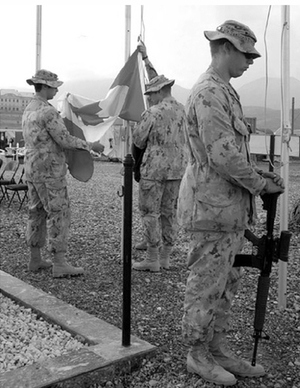
La Révolution tranquille expliquée aux jeunes
By Pierre K. Malouf on June 10, 2010
En préparation pour ce numéro, j’ai rencontré une étudiante, qui m’a interrogé sur la Révolution tranquille. Voici, sous forme de questions et réponses, une synthèse de nos échanges.
Alice : Merci de répondre à mes questions. Vous avez vécu la Révolution tranquille. Pourriez-vous nous situer dans le temps?
Moi : Avec plaisir, mademoiselle.
Résister aux comparaisons / To withstand comparisons
By Beryl Wajsman on June 10, 2010
Vous lirez beaucoup dans ce numéro au sujet de l’héritage de la Révolution tranquille dans notre vie politique, notre place sur la scène internationale, notre économie, nos mœurs sociales et nos arts. Ma réflexion dans cet espace est au sujet de ce que la Révolution tranquille - et l’extraordinaire révolutionnaire tranquille Paul Gérin-Lajoie - peut encore nous enseigner aujourd'hui et demain.
Une révolution bien plus que québécoise
By Mike Medeiros on June 10, 2010
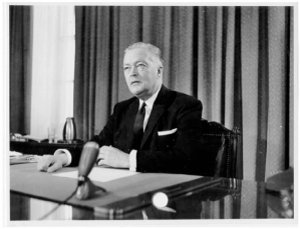 Ce mois de juin marque le cinquantième anniversaire de l’élection du premier gouvernement de Jean Lesage. L’importance de cet événement va bien au-delà de la célébration des profonds changements apporter par Jean Lesage, elle signifie le début de la Révolution tranquille. Cette période représente une série de grands changements qu’a subis le Québec. Cette révolution apporta au Québec des transformations radicales sociales, culturelles, politiques, et économiques. Nul ne peut en douter que depuis cinquante ans le Québec a fondamentalement changé.
Ce mois de juin marque le cinquantième anniversaire de l’élection du premier gouvernement de Jean Lesage. L’importance de cet événement va bien au-delà de la célébration des profonds changements apporter par Jean Lesage, elle signifie le début de la Révolution tranquille. Cette période représente une série de grands changements qu’a subis le Québec. Cette révolution apporta au Québec des transformations radicales sociales, culturelles, politiques, et économiques. Nul ne peut en douter que depuis cinquante ans le Québec a fondamentalement changé.
GÉRIN-LAJOIE: RÉFORMER ET RENOUVELER
By Alan Hustak on June 10, 2010
Une collection amusante d’une centaine d’hiboux ornementaux remplit un cabinet dans l’appartement spacieux de Paul Gérin-Lajoie - une centaine d’hiboux en cristal, porcelaine, verre, bronze et argent. Les hiboux, dans toutes les formes et tailles, sont des cadeaux qu’il a reçus au cours des années des amis qui le considèrent un vieil oiseau sage qui, comme un hibou, travail tard, et bat des paupières en reconnaissance tranquille de tout ce qu’il voit.
THE QUIET REVOLUTION: A PERSONAL REFLECTION
By Graeme Decarie on June 10, 2010
When Quebec was conquered by the British in 1763, most of its secular leaders – those around the Governor, the military, and many of the wealthy - returned to France. And very reasonably so. Their futures and their connections were in France, not in a British colony. The only French institution remaining was the Roman Catholic Church.
Georges-Emile Lapalme
By Alan Hustak on June 10, 2010
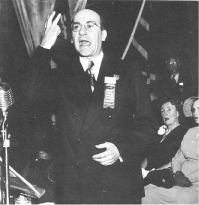 Revolutions, quiet or otherwise, rarely go according to plan. Georges Emile Lapalme might have been premier instead of Jean Lesage, had events not conspired against him “Lapalme was the main brain behind everything,” agrees Paul Gerin Lajoe, “There were others who contributed, but he was the chief engineer behind the 1960 election victory.”
Revolutions, quiet or otherwise, rarely go according to plan. Georges Emile Lapalme might have been premier instead of Jean Lesage, had events not conspired against him “Lapalme was the main brain behind everything,” agrees Paul Gerin Lajoe, “There were others who contributed, but he was the chief engineer behind the 1960 election victory.”
La place du Québec dans le monde: Les liens existants et non-utilisés!
By Alain-Michel de Perlicroix on June 10, 2010
« Le Québec est et sera une Nation à jamais »! Si ma mémoire ne me trahit pas, ce sont les paroles de feu Robert Bourassa à la suite de l’échec des pourparlers du Lac Meech. Loin de toute politique politicienne et me considérant cet immigrant, né dans un pays tiers, élevé en Europe et installé au Canada depuis plus de vingt ans, je ne peux que considérer cette phrase réaliste et vraie. Oui, le Québec est une Nation à part entière. Quant au choix de rester au sein du Canada ou de prendre son indépendance, ce sera aux Québécois et aux Canadiens de le décider ensembles. En ce qui me concerne, je me tiendrai dans cet article d’opinion à expliciter ma vision du Québec que j’aime et les efforts additionnels qu’il devrait entreprendre pour le rendre plus solide sur la scène internationale comme le voulait Paul Gérin-Lajoie.
Fifty years later: A View from Washington
By David T. Jones on June 10, 2010
As a truth in writing caveat, one must admit up front that Washington is paying no attention to Quebec. It barely pays attention to Canada (except during this time of year as a possible destination for a vacation/fishing trip); it notices Quebec only when the province is in extremis: in the throes of a "tear the country apart" referendum or, perhaps, with a dramatic winter storm with great media visuals of marching files of ice-toppled hydroelectric towers.
How to Respond to Free Gaza Flotillas
By David Solway on June 10, 2010
So much has already been written in the wake of the Free Gaza flotilla fiasco of May 31 that little remains to be said, other than to repeat the obvious: that Israel was set up, that the world’s chancelleries and the United Nations would collaborate in the usual bacchanal of condemnation, that Israel’s enemies would be gloating over yet another propaganda victory, and that Jew-haters and anti-Zionists everywhere would cite the trap into which Israel blindly stumbled as incontrovertible proof of the Jewish state’s innate savagery.
Towards a new quiet economic revolution
By Prof. Thomas Velk on June 10, 2010
The fundamental notion that lay at the heart of the economic Quiet Revolution in Quebec was that central state planning, management and control would pay off in effective delivery of vital services at affordable prices to privileged and vulnerable alike and give society an appropriate return as well. This actually succeeded, in large part, in two and possibly three sectors that are keys to Quebec’s future: hydro power, finance and (to a lesser degree) education. We followed, somewhat, the model of America’s Alexander Hamilton, who, knowing full well the benefits of free trade and private markets, nonetheless advocated a protective tariff for domestic industry, a home-grown big banking system and strong guarantees for full payment of public debt.
What do the Chinese think of the Great Recession and the Euro Crisis?
By Robert Presser on June 10, 2010
Visiting Shanghai in 2010 is the ultimate experience in Modern urban infrastructure. At the nearly-new international airport, you can take a MagLev (magnetic levitation) train that whisks you into Pudong at a top speed of 430 km/h. You then transfer to a modern subway system with 400 kilometers of track, 200 of which opened within the last year. Or, if you prefer, you can grab a cheap, new taxi from Pudong and travel into Shanghai across modern six-lane expressways and impressive new bridges that cross the river, one every few kilometers. This is the kind of town that big money, government money, buys for its citizenry when the state is wealthy and wants to show off to the world for the 2010 Shanghai Expo, the world’s fair now underway.
Fifty years after – The Church today
By P.A. Sévigny on June 10, 2010
As one of the city’s more successful antique dealers, the late Conrad Martin used to tell stories about how he started out as a ‘picker’ when he used to go up into the Gaspé and the Lac St. Jean districts to buy up whatever he could find once the province’s Catholic Church began to close up its empty churches and assorted convent properties.
“I used to make sure I had big rolls of cash,” said Martin. “I would go up to see the Abbess of the convent, put the money on her desk and make the deal right then and there before calling in the boys to load up the truck.”
La pensée de Tariq Ramadan selon Gregory Baum
By Pierre Brassard on June 10, 2010
Le théologien Gregory Baum, professeur émérite de la Faculté des sciences religieuses de l’Université McGill vient de publier: Islam et modernité : la pensée de Tariq Ramadan (Édition Bellarmin, 2010). À mon avis, son livre comporte de profondes lacunes.
Le Monde de Piperberg
By Roy Piperberg on June 10, 2010
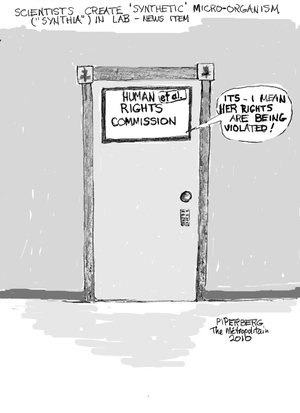
Quebec’s Celluloid Revolution
By Jessica Murphy on June 10, 2010
“Film is a vision, a point of view,” said Quebec director Michel Brault in 2003.
Brault and his peers - Quebec cultural giants the lot - were at the forefront in helping the province establish a national cinema distinct from the rest of Canada. They told stories from the viewpoint of les Quebecois. They gave a nation a voice in its own language on screens big and small.
Démocratie et égalité des sexes
By Louise V. Labrecque on June 10, 2010
Ce n’est même pas une question. Plus que jamais il faut repenser le féminisme afin de mieux comprendre la condition féminine actuelle. Diane Guilbault, l’auteure de cet extraordinaire petit livre : « Démocratie et égalité des sexes », interroge les liens complexes unissant le corps, la société, les religions, les cultes, les systèmes et les politiques, notamment les accommodements dit raisonnables. L’éducation des filles, depuis toujours, englobe le corps et cerne tout particulièrement le sexe, organe de procréation. Ce faux pouvoir, les femmes l’ont appris par cœur, au travers des siècles de silence, de mimétisme, de séduction.

